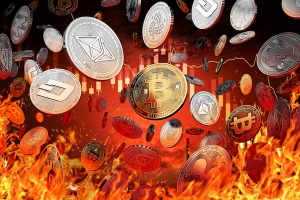Join Our Telegram channel to stay up to date on breaking news coverage
The tremors from last week’s massive earthquake in the trillion-dollar crypto industry continued to reverberate on Monday.
Prices for digital currencies fell again over the weekend as the market crisis deepened. Bitcoin, the world’s largest cryptocurrency, has dropped roughly 65% this year. It was trading at around $16,500 on Monday and analysts believe it may fall below $10,000.
Ether, the second most valuable cryptocurrency in the world, isn’t faring much better. It was trading at around $1,230 on Monday, having dropped more than 20% in the previous week. The drop comes as investors continue to grapple with the stunning implosion of FTX, one of the industry’s largest and most powerful players.
Some industry insiders believe the company’s demise triggered a “Lehman moment,” referring to the investment bank’s 2008 collapse, which sent shockwaves around the world.
The incident has not only destroyed trust in the cryptocurrency industry, but it has also emboldened global regulators to tighten the screws. Some of the industry’s biggest names have said they welcome the scrutiny if it helps restore trust in the industry.
There is “a lot of risk,” according to Changpeng Zhao, the CEO of Binance, the largest cryptocurrency exchange. “We’ve seen things go crazy in the industry in the last week, so we do need some regulations, and we do need to do this properly,” he added.
On Monday, CZ, as he is known, was speaking at a conference in Indonesia. Last week, he stated that comparing the current cryptocurrency turmoil to the 2008 global financial crisis is “probably an accurate analogy.”
Binance had reached a tentative rescue agreement with FTX earlier last week, but the transaction fell through almost immediately.
After declaring bankruptcy on Friday, FTX has continued its downward spiral. Another prominent industry figure has admitted to mishandling funds, further frightening investors.
Here’s how events have played out over the last few days, showing that the crisis may only have just begun.
The Bahamas: Criminal Investigation
Last year, FTX relocated its headquarters from Hong Kong to The Bahamas, with former CEO Sam Bankman-Fried hailing it as “one of the few places to set up a comprehensive framework for crypto.”
The Bahamas’ authorities announced on Sunday that they were looking into potential criminal misconduct in connection with the company’s demise.
“In light of the global collapse of FTX and the provisional liquidation of FTX Digital Markets Ltd.,” the Royal Bahamas Police Force said in a statement.
It is unclear which aspect of FTX’s rapid collapse authorities are looking into.
Bankman-Fried, the exchange’s 30-year-old founder, was one of the faces of the crypto industry, amassing a fortune worth $25 billion that has since vanished. He was regarded as the crypto world’s white knight, having previously intervened to save companies in distress following the collapse of the TerraUSD stablecoin in May.
FTX, backed by elite investors such as BlackRock and Sequoia Capital, quickly grew to become one of the world’s largest cryptocurrency exchanges. Its demise was precipitated by Alameda, Bankman-crypto Fried’s hedge fund, lending billions of dollars in customer assets to fund risky bets, according to The Wall Street Journal on Thursday.
A possible breach
The Bahamas investigation came a day after the bankrupt exchange announced its own investigation.
On Saturday, FTX announced that it was investigating whether crypto assets had been stolen. Elliptic, a crypto risk management firm, reported that $473 million in crypto assets appear to have been taken from FTX.
FTX General Counsel Ryne Miller stated on Saturday that the company “took precautionary measures” on Friday and took all of its digital assets offline. Friday evening, the process was accelerated “to mitigate damage upon observing unauthorized transactions.”
Miller stated that FTX was “investigating abnormalities” in crypto wallet movements “related to consolidation of FTX balances across exchanges.”
He added that the facts are still unclear and that the company will share more information as soon as possible.
Crypto.com accidental transfers and Binance response
As the spotlight shines on the crypto industry’s big players, Singapore-based Crypto.com admitted to sending more than $400 million in ether to the wrong account.
CEO Kris Marszalek announced on Sunday that 320,000 ETH were transferred three weeks ago to a corporate account at competing exchange Gate.io, rather than to one of its offline, or “cold,” wallets. Despite the fact that the funds were recovered, users are withdrawing their funds from the platform for fear of it collapsing like FTX.
Marszalek tweeted on Sunday, “We have since strengthened our process and systems to better manage these internal transfers.”
The platform’s native token has dropped more than 20% in the last 24 hours. Marszalek stated on Monday that his company has been a “responsible, regulated player since inception” and that its actions will soon “prove all the naysayers…wrong.”
Crypto.com has 70 million users worldwide, and its business model is “completely different” from FTX, he says.
“We never took third-party risks, we don’t run a hedge fund, and we don’t trade customer assets,” he explained.
Marszalek stated that his company will soon release an audited report detailing its reserves.
Binance CEO Zhao hinted at the conference in Bali that regulating the industry would be difficult.
“The natural response of authorities is to borrow regulations from traditional banking systems… “However, cryptocurrency exchanges operate very differently than banks,” he explained.
“It’s very common for a bank to move user assets for investments and try to make returns,” he explained. If a cryptocurrency exchange operates in this manner, it is “almost certain to fail,” he claims. adding that the industry as a whole had a role to play in consumer protection.
“Regulators play a role… but no one can protect a bad player,” he explained.
Related
- FTX’s stunning collapse: what really happened
- FTX used customer funds to fund risky bets, which led to its demise
- Binance will no longer buying FTX
Join Our Telegram channel to stay up to date on breaking news coverage


